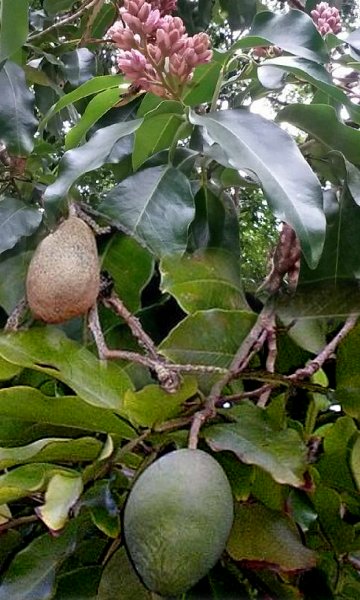
|
|
Tonka - Cumaru
(Dipteryx odorata). Flowers and fruits.
|
Tonka - Cumaru - Dipteryx odorata
Dipteryx odorata (commonly known as "cumaru", "kumaru", or "Brazilian teak") is a species of flowering tree in the pea family, Fabaceae. The tree is native to Central America and northern South
America and is semi-deciduous. Its seeds are known as tonka beans (sometimes tonkin beans or tonquin beans). They are black and wrinkled and have a smooth, brown interior. They have a strong fragrance similar to sweet woodruff due to their high content of coumarin.
The word "tonka" is taken from the Galibi (Carib) tongue spoken by natives of French Guiana; it also appears in Tupi, another language of the same region, as the name of the tree. The old genus name, Coumarouna, was formed from another Tupi name for tree, kumarú.
Dipteryx odorata is a large evergreen tree with a small, rounded crown, generally growing up to 30 metres tall but with some specimens up to 50 metres. The straight, cylindrical bole is unbuttressed; it can be unbranched for 18-24 metres and is usually 45-75cm in diameter, though diameters up to 100cm have been found. The tree bark is smooth and gray, whereas the wood is red. The tree has alternate pinnate leaves with three to six leaflets, leathery, glossy and dark green, and
small pink flower followed by large, woody fruits. Each developed fruit contains one
highly aromatic seed. D. odorata is pollinated by insects. The worst pests are the bats because they eat the pulpy flesh of the fruit.
Seeds are black and wrinkled, and have a strong fragrance due to high coumarin
content, a chemical isolate from this plant, which also gave the name to it. The seeds normally contain about 1 to 3% of coumarin, but rarely it can achieve 10%. Coumarin is responsible for the seed's pleasant odor and is used in the perfume industry. The seeds are used in perfumery and as a vanilla substitute. It is also used in French
cuisine (particularly, in desserts and stews). and in perfumes.
Coumarin is bitter to the taste, however is mildly toxic, and, in large infused doses, it may cause hemorrhages, liver damage, or paralysis of the heart. It is therefore controlled as a food additive by many
governments and commercial use of this as flavouring has been banned in some countries, particularly the USA.
Like a number of other plants, the tonka bean plant probably produces coumarin as a defense chemical.
Tonka seeds are edible. The seed pods are 5-6cm long and about 3cm in diameter. The pulp inside the seedpod is eaten raw. Seed - eaten after boiling to get rid of toxins.
The seeds can also be used in the treatment of stomach pain, cough, and dysentery. The bark is astringent and febrifuge. The leaves can be used for earache.
Many anticoagulant prescription drugs, such as warfarin, are based on 4-hydroxycoumarin, a chemical derivative of coumarin initially isolated from this bean. Coumarin, however, does not have anticoagulant properties.
The tree also yields an exceptionally attractive timber that is used locally and also exported. It is an extremely hard and heavy
wood.
Source:
https://en.wikipedia.org/wiki/Dipteryx_odorata
http://tropical.theferns.info/viewtropical.php?id=Dipteryx+odorata
https://pfaf.org/user/Plant.aspx?LatinName=Dipteryx+odorata
